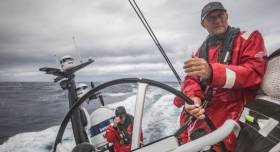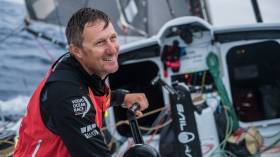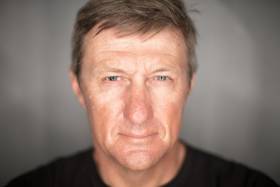Displaying items by tag: John Fisher
Volvo Ocean Race Team Sun Hung Kai/Scallywag Issue Timeline of Events Leading to Loss of John Fisher
The crew of Volvo Ocean Race entry Team Sun Hung Kai/Scallywag has put together a timeline of events to ensure accurate reporting on the incident and it follows here:
On Monday 26 March, Team Sun Hung Kai / Scallywag lost John Fisher overboard in the Southern Ocean, approximately 1,400 nautical miles west of Cape Horn.
Despite conducting an exhaustive search in gale force conditions, he has not been recovered.
"This is the worst situation you can imagine happening to your team," said SHK/Scallywag Team Manager Tim Newton, who has spoken with skipper David Witt and navigator Libby Greenhalgh about what happened on Monday.
"We are absolutely heart-broken for John's family and friends. I know for David, he has lost his best friend. It's devastating."
Newton says he asked the crew to put together a timeline of events to ensure accurate reporting on the incident and it follows here:
- On Monday, 26 March, SHK/Scallywag was racing in Leg 7 of the Volvo Ocean Race from Auckland, New Zealand to Itajai, Brazil, approximately 1,400 nautical miles west of Cape Horn
- Weather conditions were 35-45 knots with 4 to 5 metre seas with showers reducing visibility. It was 15 minutes before sunrise
- The team was sailing with a single reef in the mainsail and the J2 jib. The Fractional 0 (FR0) sail was hoisted but furled
- At roughly 1300 UTC SHK/Scallywag surfed down a large wave leading to an accidental crash gybe
- John Fisher was on deck, in the cockpit. At the time, he was moving forward to tidy up the FR0 sheet and had therefore unclipped his tether
- As the mainsail swung across the boat in the gybe, the mainsheet system caught John and knocked him off the boat. The crew on board believe John was unconscious from the blow before he hit the water
- He was wearing a survival suit with a wetsuit hood and gloves and a lifejacket
- The JON buoy and the horseshoe buoy were thrown off the back of the boat to mark the position
- It took some time to get the boat under control and motor sail back to a position near where the man overboard occurred
- At 1342 (UTC), the team informed Race Control, by email, that there was a man overboard and they were returning to the MOB position to start a search pattern
- With input from the Maritime Rescue Coordination Centre and Race Control in Alicante, a search and rescue operation was carried out for several hours but there was no sign of John, the horseshoe buoy, or the JON buoy
- With weather conditions deteriorating, a difficult decision was taken to abandon the search and preserve the safety of the remaining crew
Newton says the team is distraught but has a clear focus on getting the crew and boat back to shore.
Updates On Sun Hung Kai/Scallywag & Volvo Ocean Race Fleet
#VOR - Six crews in the Volvo Ocean Race fleet are facing challenging conditions as they race towards Cape Horn, still 900 miles and two days away.
The seventh team, Sun Hung Kai/Scallywag, is working to recover from the tragic loss of crew member John Fisher, who went overboard over 24 hours ago and is now presumed lost at sea, given the cold temperatures and rough sea conditions.
“We are devastated and our thoughts are with John’s family, friends and teammates,” said Volvo Ocean Race President Richard Brisius in a statement this morning, Tuesday 27 March. “This is heart-breaking for all of us. As sailors and race organisers losing a crew member at sea is a tragedy we don’t ever want to contemplate.”
Race director Phil Lawrence provided updates on Sun Hung Kai/Scallywag and the rest of the fleet this afternoon.
“As you can imagine, the Scallywag crew is very shocked, they are very distressed, and our focus at the moment is getting the boat safely to Chile,” Lawrence said. “They are in bad weather conditions and we are sorting out a routing for them that will keep them safe and get them to port.
“The other teams are also in very difficult conditions, with gale force winds, and approaching Cape Horn. So they have a lot on. Yesterday we sent them a short notice about what had happened and this morning we sent them a note that sadly John had not been found.”
Race veteran Bouwe Bekking, skipper of Team Brunel that is currently leading the fleet towards Cape Horn, expressed his feelings which are representative of the sentiment across all of the sailors in the Volvo Ocean Race.
“We are deeply shocked by the loss of John Fisher, known to us sailors as ‘Fish’. Our thoughts are with his family and of course the Scallywag crew. There hasn’t been a moment since we heard that I didn't wake up thinking about him…”
The six boats still racing in Leg 7 are now 900 miles from Cape Horn, with an ETA to round into the South Atlantic on Thursday UTC. Sun Hung Kai/Scallywag is forecast to make landfall in around four days time.
Volvo Ocean Race Sailor John Fisher ‘Presumed Lost At Sea’
#VOR - Richard Brisius, president of the Volvo Ocean Race, has this morning (Tuesday 27 March) issued a statement on Sun Hung Kai/Scallywag crew member John Fisher, who went overboard from the team’s yacht in the Southern Ocean yesterday:
This morning I am extremely sad to inform you that one of our sailors, John Fisher, from Team Sun Hung Kai/Scallywag, is now presumed to have been lost at sea.
This is heart-breaking for all of us. As sailors and race organisers losing a crew member at sea is a tragedy we don’t ever want to contemplate. We are devastated and our thoughts are with John’s family, friends and teammates.
Yesterday, just after 1300 UTC, Race Control for the Volvo Ocean Race were informed of a man overboard situation by Team Sun Hung Kai/Scallywag.
We immediately coordinated with the team as well as the Maritime Rescue Coordination Centre, who have located a ship and diverted it towards the scene. But at current speeds it remains over a day away.
With the rest of the Volvo Ocean Race fleet approximately 200 miles downwind, sending them back upwind to assist, against gale to storm force winds, was not a viable option.
The Sun Hung Kai/Scallywag team conducted an exhaustive search for several hours in extremely challenging weather conditions, but they were unable to recover their teammate.
Given the cold water temperature and the extreme sea state, along with the time that has now passed since he went overboard, we must now presume that John has been lost at sea.
All of us here at the Volvo Ocean Race organisation send our heartfelt condolences out to John’s family, his friends and his teammates and we will do everything in our power to support them in this very difficult time.
Team Sun Hung Kai/Scallywag has now resumed heading in a north-easterly direction.
In fact, the team is currently in a challenging position – the weather is deteriorating and is forecast to be quite severe over the course of today.
The crew is, of course, emotionally and physically drained after what they have just experienced.
Our sole focus now is to provide all the support and assistance that we can to the team.
We are sure that there will be many questions about how one of our sailors was lost overboard yesterday.
We can address those after the team has been fully debriefed.
Today, our thoughts and prayers go out to John’s family and the entire Scallywag team.





























































